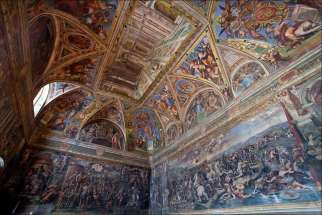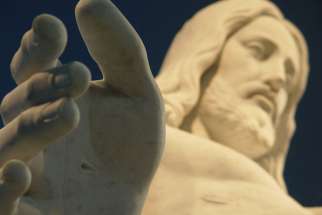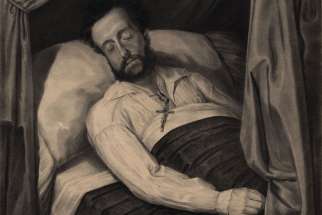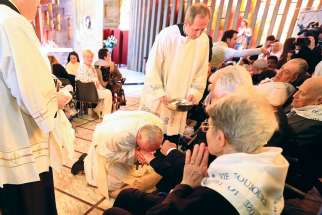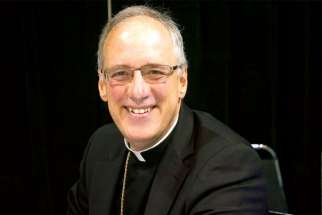Art experts solve Renaissance mystery in papal palace
VATICAN CITY – Two works painted by Renaissance master Raphael have been newly identified after art experts restored famous frescoes in the Apostolic Palace of Vatican City.
Timmins diocese investigates cemetery mystery
TIMMINS, Ont. - Alex Cande and his brother Marcel Mandeville are stirring up trouble and searching for the graves of their dead ancestors.
The Lord assures us, we will not be forsaken
When we lose the great hymns of our past we lose an irrecoverable legacy. Alas as much as we hear “Lord of the Dance” at Mass, such happy-clappy tunes will provide little solace amidst a dark night of the soul.
Euthanasia blind to the mystery of love
Raissa Maritain the philosopher and spiritual writer died some months after suffering a stroke. During those months she lay in a hospital bed, unable to speak. After her death, her husband, the renowned philosopher Jacques Maritain, in preparing her journals for publication, wrote these words:
Still astonishing good news 2,000 years later
Through the powerful Scripture readings of the Triduum, and especially the Gospels of the Easter Vigil and Easter morning, we catch glimpses of the profound meaning of the Paschal mystery. How can we give expression to the conquest of death and the harrowing of hell? We must honestly admit to ourselves that we have no words.
Innocence recovered in Jesus
The following is the Christmas message from Archbishop Paul- André Durocher, president of the Canadian Conference of Catholic Bishops.
As I write this Christmas message, barely a week has gone by since Remembrance Day, a day marked by the still fresh memory of the recent assassinations of two members of the Canadian Armed Forces. This year, Christmas in Canada will take on a different shading, muted and somber, because of these events which have saddened our hearts and our spirits.
Living the Christmas mystery with The Hobbit
Making Jesus the centre of Christmas is an important and worthy endeavour, if also a challenge in our increasingly secular culture.
Putting Christ back into Christmas evokes St. Paul’s reminder of what it means to live as a follower of Christ. “Put on Christ,” he encourages us in his Letter to the Romans (Rom. 13:14).
The ways that we seek to focus on Jesus’ birth this Christmas can help us develop some spiritual practices to make Christ the centre of our everyday lives.
One of my guides this Advent has been Bilbo Baggins, the unlikely and humble hero of The Hobbit, by J.R.R. Tolkien. (I re-read this childhood favourite so that I could fully appreciate the film, The Hobbit: An Unexpected Adventure, currently playing in theatres.) Despite the lack of an overt Christmas theme, Bilbo’s adventures can offer some insight for our spiritual journey.
Christmas celebrations are full of great art — or at least imitations of great art. (We have all had occasion to shudder at an off-key rendition of our favourite Christmas hymn.) Great art — whether visual, literary, musical, cinematic or narrative — reminds us of our true human nature, as God created us. When a work of art expresses the best of what it means to be human, this goodness can be a starting point for dialogue with our secular culture. It can also become a doorway to spiritual awareness for the believer and non-believer.
Engaging with a great work of art becomes an adventure of the kind that Bilbo Baggins goes on. The newness of his experiences makes the little hobbit keenly sensitive to the beauties and dangers around him. His dwarf companions seek to regain lost treasure, but Bilbo goes on the journey for entirely different reasons. Ultimately, he is transformed — by the beauties he experiences, the goodness he witnesses in others, the dangers he faces and the choices he makes.
We can choose to engage our secular culture with a similar sensitivity: both to the seeds of the Gospel it contains and to its innate dangers. Especially at Christmas when the artistic expression is often clearly Christian, we can highlight the best of these expressions of faith. Instead of just listening to the radio, we can play a mix of religious hymns, letting their awe and wonder flood our hearts. We can look more closely at the masterpieces on our Christmas cards, even using them in our prayers as a way to meditate on the amazing mystery of the Incarnation.
Throughout the year, we can become like the magi, seeking Christ in the secular corners of our culture.
Gift-giving in a consumer culture easily becomes an exercise in impressing others, a way to “prove” our love by how much money we spend, or a way to “use” one another — gift-giving in the hopes of getting something back. Consumerism falsely fulfills our insecurities through the acquiring of more and more material things.
In The Hobbit, the dwarves’ attitudes toward the dazzling treasure are quite consumeristic. Bilbo is the one who sees the gold for what it is: useful only up to a certain point. His brushes with gold help him to see with a spiritual vision and to choose friendship over treasure, honesty over deception, justice over greed.
As Bilbo clearly saw, material things are gifts to be used and shared. We can strive to make our Christmas gifts more authentic expressions of love, more personal and meaningful: a homemade gift card for going out for ice cream together; a hand-crafted item; a favourite spiritual book. This personal approach shifts our focus from the gift to our relationship with the person receiving the gift. Gift-giving then takes its proper place as a celebration of God’s abundant love for us.
Throughout the year, we can continue to shift from our consumeristic, “gotta-have-it” attitude to a deepening perspective of gratitude. We can seek to share what we have received, giving of ourselves with greater love.
Christmas Mass is where we celebrate the ultimate gift: God’s coming to us. This coming of God is a mystery and a grace to be celebrated year-round with a humble and brave “hobbit-like” heart that views the spiritual life as a quest for a more abundant life. Every Mass — not just Christmas — becomes an invitation for us to cherish the coming of our God, to welcome Him, and to respond to His coming with love.


